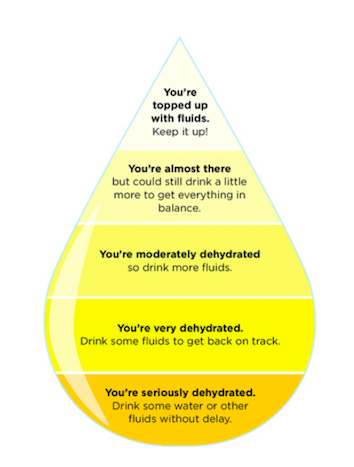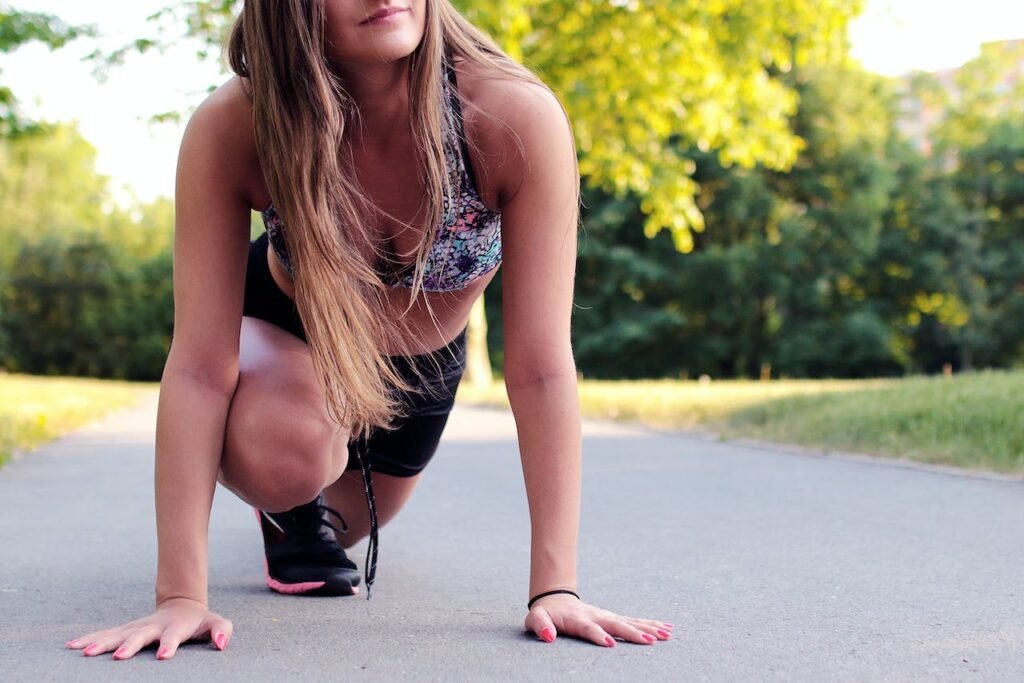HOW MUCH WATER DO YOU NEED?
Your body is about 60 percent water.
The body constantly loses water throughout the day, mainly through urine and sweat, but also from regular body functions like breathing. To prevent dehydration, you must get plenty of water from drinking and eating daily.
But how much water should you drink a day? It depends on a lot of things and varies from person to person. In a healthy, barely physically active adult, the amount of fluid needed amounts to approximately 30-35 ml per kg of body weight. A person weighing 70 kg therefore needs a regular total fluid intake (food and drink) of approximately 2 to 2½ liters.
This includes fluids from water, beverages like teas and juice, and from food. You get an average of 20 percent of your liquid from the foods you eat. That might mean you need only four to six cups of plain water, depending on other fluid sources such as coffee, tea, juice, fruits, and vegetables.
However, there are few factors you need to take into consideration when more plain water is needed:
Activity level: If you’re losing water through sweat because you’re exercising, you should increase your liquid intake. Individuals participating in long stretches of physical activity, such as marathons, often need to replace both water and sodium losses.
Outside temperatures: You should adjust your liquid level when the temperatures soar outside. In warmer temperatures, you might feel thirstier faster.
Overall health and medications: It’s possible to take in too much water if you have certain health conditions, such as thyroid disease or kidney, liver, or heart problems; or if you’re taking medications that make you retain water, such as nonsteroidal anti-inflammatory drugs (NSAIDs), opiate pain medications, and some antidepressants.
Age: Older people don’t sense thirst as much as they did when they were younger. And that could be a problem if they’re on a medication that may cause fluid loss, such as a diuretic.
Pregnant or breastfeeding: If you’re pregnant or nursing your baby, you’ll need to drink extra water to stay hydrated. Your body is doing the work for two (or more), after all.
Special diet: if you are on a high-protein diet you need more water to help the kidneys process the extra protein. For high-fiber diet you need more liquid to help prevent constipation.
BENEFITS OF DRINKING WATER:
Water keeps every system in the body functioning properly. The Harvard Medical School Special Health Report 6-Week Plan for Health Eating notes that it has many important jobs, such as:
- carrying nutrients and oxygen to your cells
- flushing bacteria from your bladder
- aiding digestion
- preventing constipation
- normalizing blood pressure
- cushioning joints
- protecting organs and tissues
- regulating body temperature
- maintaining electrolyte (sodium) balance.
DOES DRINKING A LOT OF WATER HELP YOU LOSE WEIGHT?
There are many claims that drinking more water may reduce body weight by increasing your metabolism and curbing your appetite.
According to research, drinking more water than usual correlated to a decrease in body weight and body composition scores.
Another review of studies found that chronic dehydration was associated with obesity, diabetes, cancer, and cardiovascular disease.
Researchers in another older study estimated that drinking 68 ounces (2 liters) in one day increased energy expenditure by about 23 calories per day due to a thermogenic response, or faster metabolism. The amount was incremental but could add up over time.
Drinking water about a half hour before meals can also reduce the number of calories you end up consuming. This might happen because it’s easy for the body to mistake thirst for hunger.
One 2010 study in middle age and older adults showed that people who drank 17 ounces (500 mL) of liquid before each meal lost 44% more weight over 12 weeks, compared to those who didn’t. A more recent study in young men showed that people who drank about 19 ounces (568 mL) of water before each meal reduced the amount that the participants needed to eat during the meal to feel sated.
Overall, it seems that drinking adequate amounts of liquid, particularly before meals, may give you a boost in managing appetite and maintaining a moderate body weight, especially when combined with a balanced eating plan.
HOW MUCH WATER SHOULD I DRINK WHEN EXERCISING?
Water is the best drink to satisfy thirst and replace fluid lost during exercise. Drink water before you start exercising, too.
As a rule of thumb, drink a 250ml glass of water 30 minutes before you hit the gym to ensure your muscles are firing on all cylinders. Then follow that up with 500ml within 30 minutes of finishing. Deciding how much to sip mid-session is more subjective. “Around 500ml of water during the course of a one-hour workout is sensible,” says nutritional therapist Jo Scott-Dalgleish.
After 90 minutes moderate exercise, water is no longer enough. At this point, your glycogen stores are mere fumes and it’s time to start sipping electrolyte-rich sports drinks. For endurance athletes, managing minerals is exceptionally important and, although the concept of drinking too much liquid may seem strange, it can be dangerous.
Downing liters of water without replacing electrolytes can cause a condition called hyponatremia, which may lead to seizures, organ failure and even death. If you’re tackling long distance runs, ensure you have a tried-and-tested hydration strategy in place.
DEHYDRATION
Dehydration occurs when the liquid content of the body is too low. This is easily fixed by increasing fluid intake.
Symptoms of dehydration include:
- thirst
- headaches
- lethargy
- mood changes and slow responses
- dry nasal passages
- dry or cracked lips
- dark-colored urine
- weakness
- tiredness
- confusion and hallucinations.
A quick way to test how well you`re hydrated is to check the color of your urine:

If dehydration is not corrected by fluid intake, eventually urination stops, the kidneys fail, and the body can’t remove toxic waste products. In extreme cases, dehydration may result in death.
Causes of dehydration
There are several factors that can cause dehydration including:
- Not drinking enough liquid.
- Increased sweating due to hot weather, humidity, exercise or fever.
- Insufficient signaling mechanisms in the elderly – sometimes, older adults do not feel thirsty even though they may be dehydrated.
- Increased output of urine due to a hormone deficiency, diabetes, kidney disease or medications.
- Diarrhea or vomiting.
- Recovering from burns.
TIPS FOR DRINKING MORE WATER
- Add a squeeze or slice of lemon or lime, or some strawberries or mint leaves to plain water to add variety.
- Keep a bottle or glass of water handy on your desk or in your bag.
- Add ice cubes made from fresh fruit to a glass of water.
- Remind yourself. Set a timer on your phone to notify you throughout the day to drink, drink, drink.
- Track it. Whether you prefer to use an application on your phone or a pen and paper, jot down the amount of water you drink each day. This will help you know if you’re meeting your goals and hold you accountable.
For more detailed information and personalized water consumption amount based on your daily routines, please get in touch with me by email or fill out the Contact form!
Sources:

Sounds really Cool, Thanks Signe for detailed information. Speak to you soon.
Very useful! Thank you!
After I started to follow your instructions and personalised fitness plan, I have noticed that to drink 2 l of water per day is natural body need, I feel with much more energy, the quality of sleep has been increased and also concentration skills are more constant.
Thank you Signe!